Ever notice how manufacturers can run a 200-step production line with perfect precision… but when it comes to marketing, everything suddenly turns into guesswork?
One email blast here. A trade show there. A brochure nobody updates. And somehow, this is expected to generate steady leads.
B2B manufacturer marketing works a lot better when you treat it the same way you treat your operations: build a system, keep it simple, measure what matters. Once you do that, leads stop feeling like happy accidents and start feeling like output.
This guide shows you the strategies that actually create that kind of output. Practical. Repeatable. Built for real manufacturing teams.

The Core Basics of B2B Manufacturing Marketing
Before you dive into specific tactics, it helps to understand what “marketing” actually means for a manufacturer. It’s about using a few simple methods to help the right buyers learn who you are, what you make, and why you’re a dependable choice.
At a basic level, B2B manufacturer marketing focuses on three things:
1. Showing your capabilities clearly: Buyers want straight answers. They look for materials, processes, certifications, capacity, and past work. Your marketing needs to present this information in a simple, organized way.
2. Making it easy for buyers to find you: Be it through search engines, industry platforms, or helpful content, your job is to show up in the places where buyers already look for suppliers.
3. Giving prospects a reason to reach out: A clear next step, a helpful resource, or a quick way to request a quote can turn interest into a real lead.
These are the basics every manufacturer can understand. Once you build around them, every strategy you add, from SEO to content to paid outreach, makes a bigger impact because it connects to how buyers actually evaluate suppliers.
Strategy 1: Balancing Digital and Physical Trade Show Marketing
Trade shows are evolving. While everyone debates whether digital marketing is replacing face-to-face events, smart manufacturers are using digital to make their trade show investments work harder.
You already know trade shows work. You've probably closed more business in three days at an expo than most companies generate online all year. But here's what's changed: the buyers walking your booth have already done their homework. They've researched exhibitors online, downloaded case studies, and narrowed their shortlist before stepping foot on the show floor.
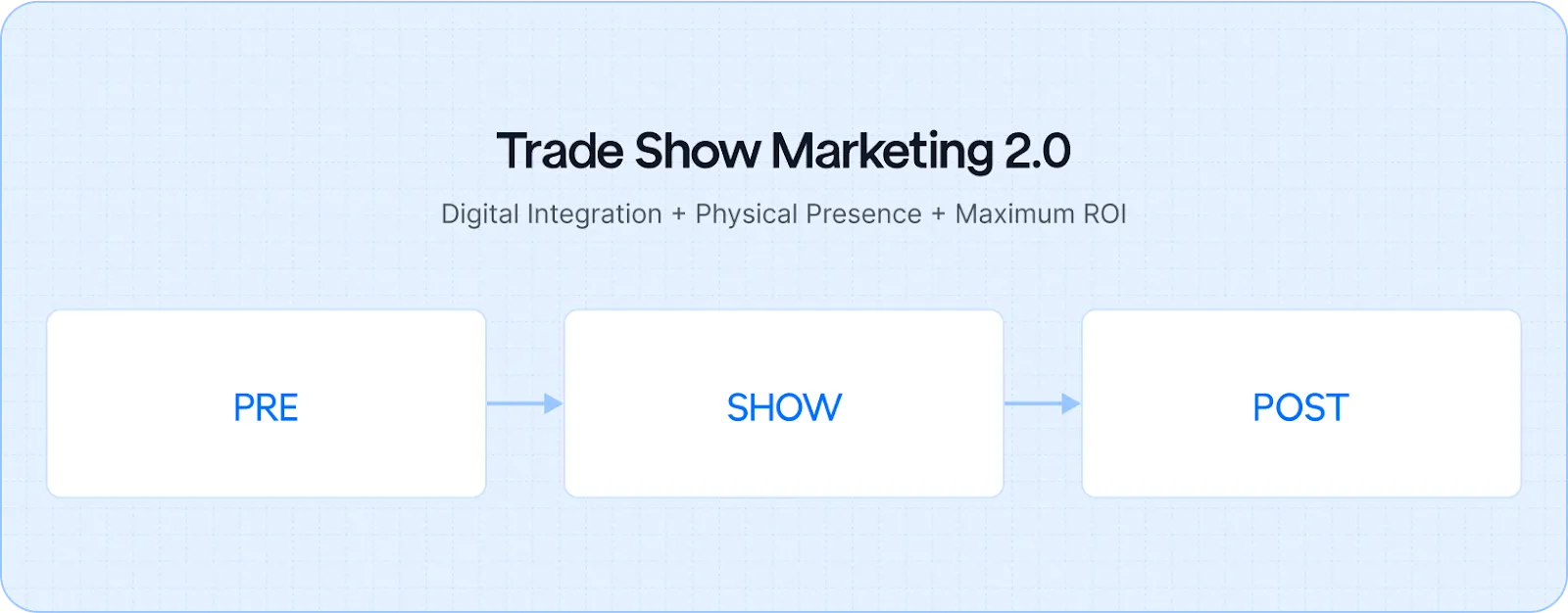
The manufacturers dominating trade shows are using digital marketing to control who visits and how ready they are to buy.
Pre-Show Digital Preparation
Getting on Buyer Research Lists Before the Show
According to the Center for Exhibition Industry Research (CEIR), 76% of trade show attendees research exhibitors online before attending. Your success at the show is decided before the first handshake.
Most manufacturers hope for foot traffic and pray the right buyers find them. Smart manufacturers ensure they're already on the research list of every qualified attendee.
Pre-show visibility strategies:
1. Optimize for "[Trade Show Name] exhibitors" searches: Create dedicated landing pages targeting:
- "IMTS 2024 exhibitors precision machining"
- "Pack Expo automation equipment exhibitors"
- "Fabtech metal fabrication companies"
These pages should highlight what you're showcasing, include booth numbers, and offer pre-show meetings.
2. LinkedIn targeting for show attendees: LinkedIn's event targeting lets you reach people who've indicated they're attending specific trade shows. Run campaigns 4-6 weeks before the show to build awareness.
3. Industry publication partnerships: Many trade publications create exhibitor spotlights or buyer's guides.
4. Email outreach to existing contacts: Your current clients and prospects who'll be attending should know you're exhibiting. Send personalized invitations 6 weeks, 2 weeks, and 1 week before the show.
During-Show Integration
QR Codes to Specific Case Studies
Your booth conversations are limited by time and noise. QR codes let prospects dive deeper into your capabilities without crowding your booth or requiring a sales pitch.

Strategic QR code placement:
Equipment displays: Link to technical specifications, performance videos, or customer testimonials about that specific machine.
Case study posters: Let prospects scan to read the full case study with detailed specifications and outcomes.
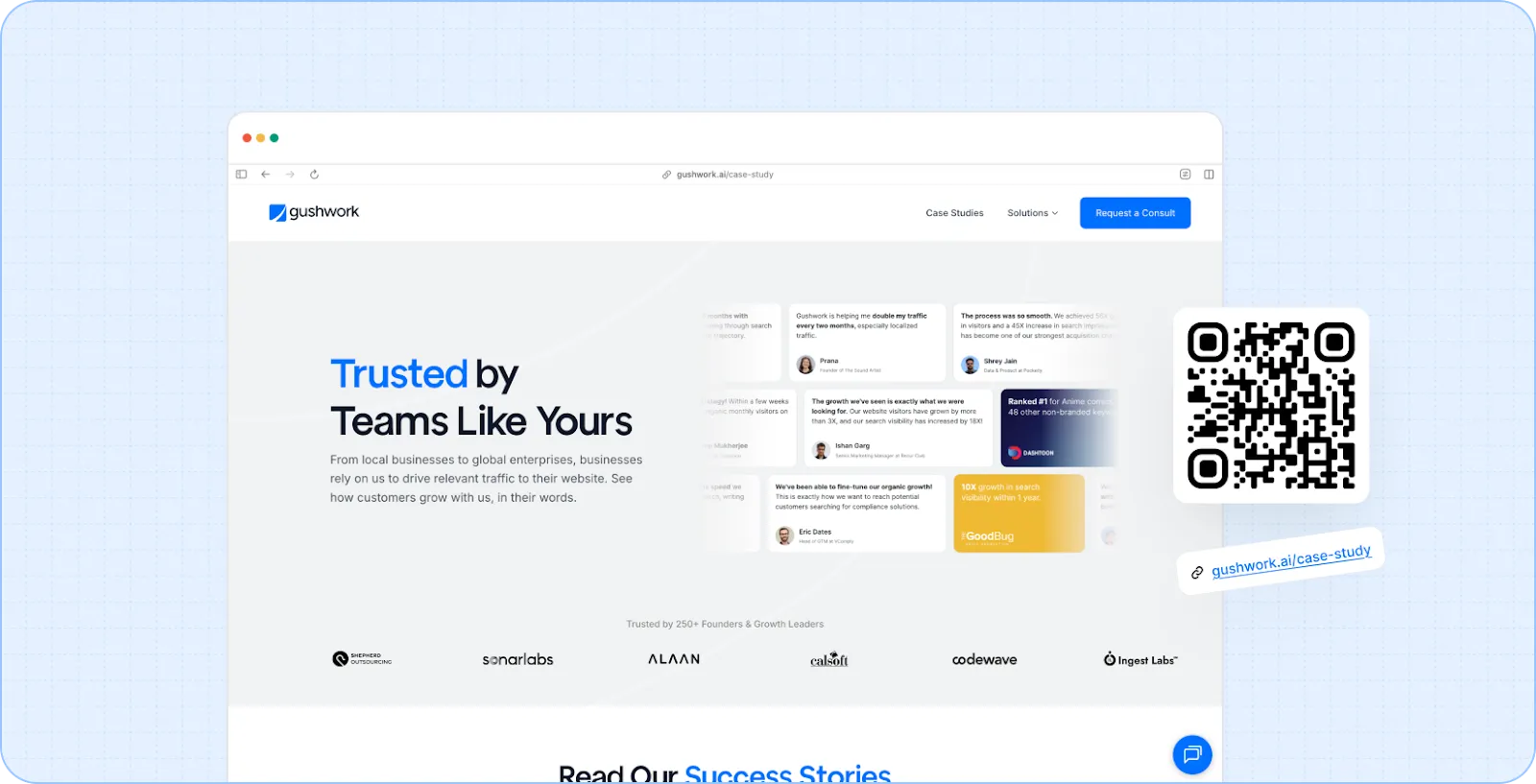
Industry application examples: Create QR codes for different industries you serve, linking to relevant project galleries.
Capability demonstrations: Link to longer videos showing the complete process or installation.
Example QR code strategy: A precision machining company had different QR codes for aerospace, medical device, and automotive applications. Each led to industry-specific case studies and capability overviews. They tracked 847 scans over three days and could see that 60% of interest was in medical devices, leading them to focus booth conversations accordingly.
Real-time qualification:
Instead of collecting business cards and hoping, use your booth conversations to qualify and segment prospects digitally:
Hot prospects: Schedule follow-up calls before they leave your booth. Send calendar invitations immediately.
Warm prospects: Add to nurture sequences with relevant case studies and technical content.
Cold prospects: Include in general company updates and industry news.
Post-Show Nurturing
The real work begins after the show ends. Most exhibitors send generic "thanks for visiting" emails and wonder why nothing happens. Effective post-show nurturing continues the conversation with relevant, valuable content.
48-hour follow-up sequence:
Day 1: Personal thank you email referencing specific booth conversation. Include promised information and clear next steps.
Day 2: Share relevant case study or technical resource based on their expressed interest.
Week 1: Provide additional technical information or invite to facility tour/virtual demonstration.
Segmented nurture campaigns:
For immediate opportunities (projects within 90 days):
- Weekly check-ins with project updates
- Relevant case studies and references
- Facility tour invitations
- Technical consultations
For future opportunities (6+ month timeline):
- Monthly technical newsletters
- Industry trend reports
- New capability announcements
- Quarterly "staying in touch" calls
For general interest (no specific project):
- Quarterly company updates
- Annual capability overview
- Invitation to next year's trade show meetings
Manufacturers who master this digital integration with trade shows dominate them. They're attracting pre-qualified prospects who are ready to discuss specific projects.
Trade Show Marketing 2.0 isn't about choosing between digital and face-to-face, it's about using digital to make every face-to-face interaction count.
Strategy 2: Utilise Website as a Tool to Capture Leads
Your website is where all other marketing strategies converge. SEO drives traffic to it, Google Ads land prospects on it, trade show leads research you through it, and email campaigns direct recipients to it.
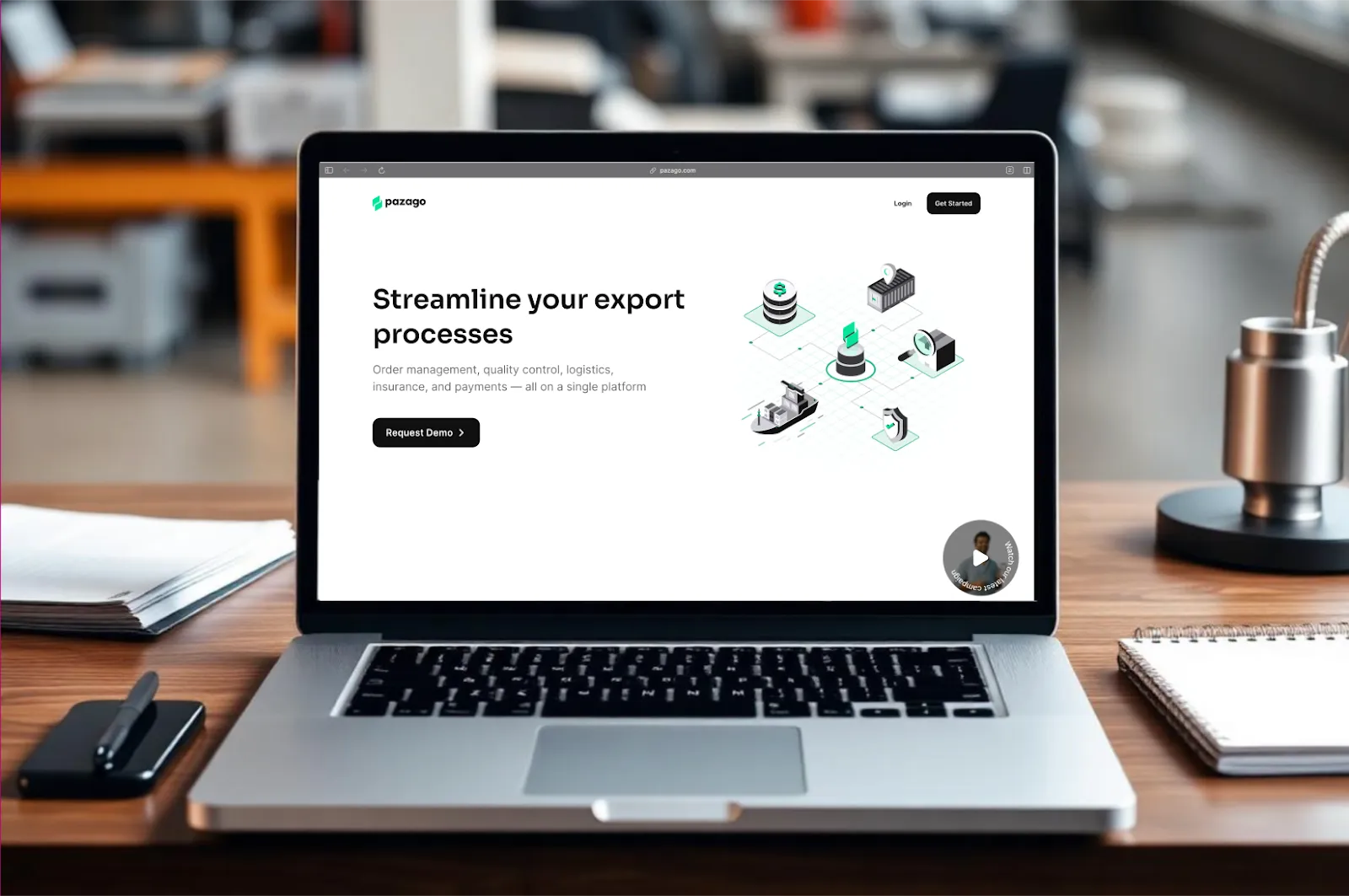
Before diving into optimization, understand that your website serves a different purpose than consumer brands or SaaS companies:
Consumer websites focus on: Impulse purchases, emotional appeals, quick decisions
Manufacturing websites focus on: Technical validation, capability assessment, trust building
Your buyers are asking:
- "Can they handle our specifications?"
- "Do they have the right certifications?"
- "Have they solved problems like ours before?"
- "Are they reliable enough to trust with our production?"
Your homepage has 8 seconds to communicate three things:
- What you make (specific products/services, not "quality solutions")
- Who you serve (industries, company sizes, application types)
- What makes you different (unique capabilities, not generic quality claims)
Capability Pages
Each service or capability needs its own dedicated page that functions like a technical data sheet combined with a case study portfolio.
Essential elements for capability pages:
- Technical specifications: Equipment capabilities, tolerance levels, material options
- Quality certifications: Industry-specific standards and compliance
- Process overview: Step-by-step workflow with quality checkpoints
- Industry applications: Specific examples of parts/products you've manufactured
- Case study gallery: Visual examples with project details and outcomes
- Request quote form: Specific to that capability with relevant fields
Site Speed and Core Web Vitals
Industrial buyers are researching during lunch breaks, between meetings, and on mobile devices. Slow-loading websites lose qualified prospects before they see your capabilities.
Common manufacturing website performance issues:
- Page load speed: Website takes more than 3 seconds to load
- Oversized images: High-resolution facility photos and product images
- Video autoplay: Capability videos that slow initial page load
- Multiple tracking scripts: Analytics, chat widgets, lead capture tools
- Unoptimized PDF downloads: Large capability brochures and spec sheets
Mobile Optimization for B2B Buyers
B2B research also happens on mobile devices, but many manufacturing websites are designed only for desktop viewing. Engineers research suppliers during facility walks, procurement teams review options during commutes, and decision-makers browse capabilities between meetings.
Mobile optimization priorities:
- Touch-friendly navigation: Easy access to key pages and contact information
- Readable content: Proper font sizes and spacing for technical specifications
- Simplified forms: Mobile-friendly lead forms with smart field validation
- Click-to-call functionality: Direct phone access for urgent inquiries
- Compressed images: Fast-loading product and facility photos
Strategy 3: Show Up When Buyers Are Looking
SEO is about being found when buyers search “custom conveyor systems food processing” or “precision CNC machining aerospace parts.” In a survey of U.S. manufacturers, SEO was the top-performing channel, because it connects you with buyers already researching solutions.

Why manufacturing SEO is different
Your buyers are searching for specific solutions to specific problems:
High-Intent Manufacturing Keywords:
- "ASME-certified pressure vessel fabrication [location]"
- "Precision CNC machining aerospace parts"
- "Custom conveyor systems food processing"
- "Automated bottling line manufacturers California"
- "ISO 9001 machine shop near me"
Low-Intent Generic Keywords:
- "Industrial equipment"
- "Manufacturing solutions"
- "Quality products"
- "Custom fabrication"
The difference is buying intent. Someone searching "automated bottling line manufacturers California" is likely planning a capital purchase. Someone searching "industrial equipment" could be a student doing homework.
How to find high-intent keywords:
- Start with your sales conversations. What specific problems do prospects describe? What exact phrases do they use?
- Analyze your existing RFQs. Look at the language buyers use in their requests. They're literally telling you what they searched for.
- Use tools like Google's "People also ask" and "Related searches" to find variations of your core terms.
- Think like an engineer, not a marketer. Technical buyers search for specifications, not marketing speak.
Local SEO
Manufacturing is still a relationship business. Buyers want suppliers they can visit, inspect, and build trust with. That's why local SEO drives some of the highest-converting traffic for manufacturers.
Local SEO wins for a Texas-based custom fabricator: After optimizing for "custom stainless steel fabrication Dallas," they jumped from page 3 to position 2 in six months. Result: 40% increase in qualified RFQs from local searches.
Answer Engine Optimization (AEO)
Search is evolving beyond traditional rankings. Google is increasingly pulling direct answers into featured snippets, and AI search tools like ChatGPT and Claude are answering questions without requiring clicks.
This shift toward Answer Engine Optimization (AEO) means your content needs to clearly and completely answer specific buyer questions, not just rank for keywords.
Traditional SEO approach: Target "CNC machining services" with keyword-stuffed content
AEO approach: Answer "What tolerance levels can CNC machining achieve for aerospace parts?" with specific, structured information
How to optimize for Answer Engines:
- Structure content as Q&A. Start with the exact question buyers ask, then provide a direct, complete answer.
- Use clear hierarchies. Headers, bullet points, and numbered lists make content easier for AI to parse and feature.
- Include specific data. Instead of "high precision," say "±0.0001" tolerance." Instead of "fast turnaround," say "48-hour prototyping."
- Cover the complete buyer journey. Answer not just "what" but "how," "why," and "what's next."
Strategy 4: Strategic Google Ads
Google Ads ranked 3rd in manufacturing survey (14% called it most successful), but here's what that statistic misses: the manufacturers using Google Ads correctly aren't treating them as a permanent lead generation engine. They're using them as a testing ground to learn what works, then building sustainable marketing around those insights.
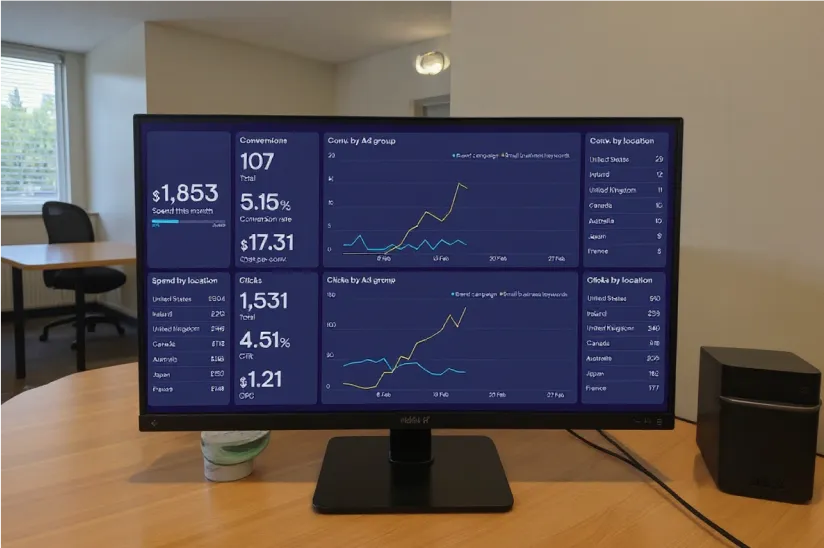
The real value is learning which keywords convert, what messaging resonates, and which value propositions drive action. Then you apply those insights to improve your SEO, website content, and sales process.
High-Intent Keywords That Convert
The difference between profitable Google Ads and budget-burning campaigns comes down to keyword intent. Most manufacturers target broad terms because they seem to offer more volume. But volume without intent is just expensive traffic.
Example: Why High-Intent Keywords Outperform Broad Keywords
Cost per Lead Comparison (Monthly Budget: $5,000)
The "high-intent" keywords delivered nearly 3x more leads at less than half the cost per lead.
How to identify high-intent manufacturing keywords:
- Include location modifiers. "CNC machining California" shows more intent than "CNC machining."
- Target solution-specific terms. "Automated packaging line" is better than "automation equipment."
- Think procurement language. Use terms that appear in RFPs and technical specifications.
Competitor Targeting Strategies
Your competitors' brand names can be some of your highest-converting keywords, if you do it right. When someone searches for "Competitor Name + pricing" or "Competitor Name + alternatives," they're actively shopping around.
Effective competitor targeting approaches:
Direct competitor comparisons:
- "[Competitor] alternative"
- "[Competitor] vs [your company]"
- "[Competitor] pricing"
- "[Competitor] reviews"
Competitor targeting best practices:
- Focus on differentiation, not price. Competing only on price commoditizes your service.
- Highlight unique capabilities. If they're a large shop, emphasize your flexibility. If they're small, emphasize your capacity.
- Use landing pages specific to the competitor. Address why buyers might be looking for alternatives.
- Best practice for competitor landing page campaigns: Don't bash the competition. Instead, highlight what makes you different
- Be respectful but confident. Professional confidence wins over defensive comparisons.
Landing Pages That Convert
Your Google Ads might get clicked, but your landing pages determine if those clicks become RFQs.
Fast-Loading, Mobile-Optimized RFQ Forms
Manufacturing buyers research on mobile devices more than you think. Your plant manager might be walking the factory floor when they remember to research that new machining supplier. Your procurement team might be comparing options during their commute.
Essential landing page performance requirements:
- Load time under 3 seconds. Every second of delay costs you 7% of conversions.
- Mobile-responsive design. 40% of B2B research happens on mobile devices.
- Single focus. One offer, one call-to-action, no navigation distractions.
- Above-the-fold RFQ form. Don't make buyers scroll to take action.
Trust signals to strengthen lead conversion:
- Industry certifications (ISO 9001, AS9100, etc.)
- Client logos (when permitted)
- Years in business
- Facility size or equipment list
Provide next steps after they fill out the form like "You'll receive a response within 4 hours during business days. For urgent requests, call [phone number] directly."
Specific Value Props for Different Buyer Types
Manufacturing purchases involve multiple stakeholders with different priorities. Your landing pages need to speak to all of them without becoming unfocused.
For Engineers (Technical Decision Makers):
- Equipment capabilities and specifications
- Tolerance levels and quality standards
- Material certifications and compliance
- Technical case studies and process details
"±0.0001" tolerances on aerospace components. AS9100 certified with full material traceability."
For Procurement (Financial Decision Makers):
- Competitive pricing and value
- Delivery reliability and lead times
- Supply chain stability
- Cost reduction examples
"Reduce part costs 15-30% through design optimization. 99.2% on-time delivery rate over 15 years."
For Operations (Implementation Decision Makers):
- Installation and integration support
- Training and documentation
- Ongoing service and support
- Minimal production disruption
"Complete turnkey installation with operator training. 24/7 service support to minimize downtime."
Using Ads Data to Inform Long-Term Strategy
The real power of Google Ads is the insights that improve everything else you do.
What to track beyond conversions:
- Which keywords generate the highest-quality leads (use this for SEO targeting)
- What ad copy gets the highest click-through rates (apply to website headlines)
- Which value propositions drive the most conversions (emphasize in sales conversations)
- What questions prospects ask most often (create content to answer them)
Monthly ads review checklist:
- Which keywords drove qualified leads vs. junk inquiries?
- What ad copy variations performed best?
- Which landing pages had the highest conversion rates?
- What time of day/week generated the best leads?
- Which geographic areas provided the most opportunities?
When you treat Google Ads as a testing ground for insights, you build a smarter, more profitable marketing engine.
Book a Strategy Call to see how we can help you get more qualified leads using Google Ads.
Strategy 5: Email Marketing
In 2022, email marketing ranked as the best-performing marketing tactic for manufacturers and it delivered stronger ROI than any other channel. Yet despite its top results, many teams still underperform because they run campaigns like consumer brands: generic, promotional, and disconnected from how engineers and procurement teams actually make decisions.

Industrial buyers don’t want glossy product templates. They want technical insights that help them solve problems, justify investments, and run operations smoothly. The payoff comes from steady education from your emails that keeps them top of mind until thet are ready to buy.
Segmentation by Industry and Role
Content for Engineers vs. Procurement vs. Operations
Manufacturing purchases involve multiple stakeholders, each with different priorities and information needs. Sending the same email to every contact is like using the same cutting tool for aluminum and titanium: misaligned approach, poor results.
As mentioned in the Google Ads Strategy:
- Engineers: Need specs, compliance, and performance data. Prefer detailed updates monthly or quarterly.
- Procurement: Focus on cost, delivery, and ROI. Prefer concise business summaries quarterly or annually.
- Operations: Care about smooth implementation and support. Prefer practical, process-focused insights bi-monthly.
The same information needs to be presented differently depending on who's reading it. Engineers want the full technical story. Procurement wants the business impact. Operations wants the practical implications.
Educational Nurture Sequences
Problem Identification → Solution Education → Vendor Evaluation
Manufacturing sales cycles are long because the buying process is complex. Your email sequences need to support buyers through each phase of their journey, not just push for immediate action.
Phase 1: Problem Identification (Months 1-3) Buyer thinking: "We have issues, but not sure of the best approach to solve them"
Email sequence goals:
- Help identify symptoms of problems they might not recognize
- Educate about root causes and implications
- Position problems as solvable with proper approach
Phase 2: Solution Education (Months 4-8) Buyer thinking: "We know we need to address this, but exploring different approaches"
Email sequence goals:
- Compare different solution approaches objectively
- Explain decision criteria and evaluation frameworks
- Share educational content that builds trust and expertise
Phase 3: Vendor Evaluation (Months 9-12) Buyer thinking: "We're ready to evaluate suppliers and get proposals"
Email sequence goals:
- Demonstrate specific relevant experience
- Provide evaluation criteria and vendor comparison frameworks
- Make it easy to initiate formal discussions
Automated Follow-Up for Long Sales Cycles
Manufacturing sales cycles often span 12-18 months. Manual follow-up is inconsistent and resource-intensive. Automated sequences ensure consistent touchpoints without overwhelming your sales team.
Stop trying to get immediate responses. Start building relationships with information that makes buyers better at their jobs. When they're ready to make purchasing decisions, you'll be the trusted advisor they call first.
Email marketing does wonders when you are being useful, credible, and top-of-mind when buying decisions happen on industrial timelines. The manufacturers who master this approach build lasting relationships with the technical decision-makers who influence purchasing for years to come.
Thousands of Clicks &Views, Yet Zero Leads: What’s Going Wrong?
You've probably been told that "all B2B marketing is the same." Digital strategies that work for software companies will work for you. Here's why that advice keeps burning your budget without filling your pipeline.
1. The Fast-Cycle Fallacy
Most B2B marketing strategies assume buyers make decisions in 30-90 days with a single decision-maker. SaaS companies love to talk about their "frictionless buyer journey" where someone discovers a problem on Monday and signs up for a trial by Friday.
But when you're selling a $500K automated packaging line or custom-engineered conveyor systems. Your buyers aren't impulse purchasing.
They're planning capital expenditures 12-18 months in advance. The "quick decision" your marketing consultant keeps optimizing for doesn't exist in manufacturing.
A typical manufacturing purchase involves 6-8 stakeholders:
- Engineering wants technical specifications and performance data
- Procurement needs competitive pricing and delivery timelines
- Operations demands minimal downtime during installation
- Finance requires ROI justification and budget approval
- Safety needs compliance documentation
- Maintenance wants service support and spare parts availability
Yet most marketing advice assumes you're selling to one person with one pain point. That's why your "targeted" campaigns feel scattered and your "personalized" content feels generic.
2. Not Giving Strategies Time to Work
The mistake: Quitting too soon because results aren’t immediate.
How it shows up: A company abandons SEO after three months or Ads after one quarter, constantly restarting instead of optimizing.
How to avoid it:
- Set realistic timelines (SEO = 6–12 months, Ads = 2–6 months, Email = 6–12 months)
- Track leading indicators (rankings, engagement, list growth)
- Communicate timelines upfront so leadership doesn’t pull the plug prematurely
3. The "Digital-First" Disconnect
Here's what most marketing experts don't understand about manufacturing: relationships still matter more than algorithms.
Your buyers might research you online, but they're not buying based on your blog posts. They're buying because they trust you to deliver when their production line goes down at 2 AM.
Generic digital marketing advice treats every interaction like a consumer purchase. "Optimize your funnel." "A/B test your CTAs." "Nurture with email sequences."
But manufacturing buyers want to know the problems you've solved for companies like theirs. They want to touch your equipment, meet your engineers, and understand your service capabilities.
4. Poor Website Planning
Walk through most manufacturing websites and you'll see the same conversion-killing mistake: "Contact Us for Custom Solutions."
That's not a call-to-action. That's a barrier.
Your buyers are doing research. They're comparing options. They're building technical specifications. And your website is asking them contact details before you've proven you're worth their time.
What buyers actually search for:
- "Automated bottling line manufacturers California"
- "Custom conveyor systems food processing"
- "ASME-certified pressure vessel fabrication"
- "Precision CNC machining aerospace parts"
What most manufacturers optimize for:
- "Industrial equipment"
- "Manufacturing solutions"
- "Custom fabrication"
- "Quality products"
The mismatch is killing your visibility. When buyers are ready to research, they can't find you. When they do find you, your content doesn't answer their specific questions.
Your website needs to work like a technical resource center. Buyers should be able to assess your capabilities, understand your process, and evaluate fit before they ever contact you.
5. Trying to Be Everywhere at Once
The mistake: Spreading efforts across every channel instead of focusing.
How it shows up: A machining shop launches SEO, Google Ads, email, LinkedIn, and trade shows simultaneously. Three months later, everything is mediocre and the team is exhausted.
How to avoid it:
- Focus on 2–3 proven channels (SEO, Google Ads, trade shows for most)
- Achieve competence before expanding
- Allocate resources realistically
- Add channels sequentially, not simultaneously
6. Confusing Sales Activity with Marketing Strategy
In most manufacturing companies, "marketing" means trade show booths, product brochures, and lead lists for the sales team. That's not wrong, it's just incomplete.
Sales handles:
- Direct engagement with qualified prospects
- Relationship management and deal progression
- Technical discussions and custom proposals
- Contract negotiation and closing
Marketing should handle:
- Building visibility when buyers are researching
- Educating prospects about problems and solutions
- Establishing credibility before sales conversations begin
- Creating content that supports the entire buying process
If marketing is only a support role, it never drives demand. That means the sales team begins every conversation with no awareness, trust, or momentum.
7. Using Google Ads Wrong
Google Ads can work for manufacturers. We've seen precision machining shops generate qualified leads at $150 per lead. But most manufacturers use them as a permanent solution instead of a testing ground.
The rental approach (what most do):
- Run ads indefinitely to maintain lead flow
- Stop paying = leads stop immediately
- No lasting value beyond active campaigns
The building approach (what works):
- Use ads to test messaging and identify winning keywords
- Apply insights to improve SEO and website content
- Build organic visibility that works while you sleep
- Use ads for testing new markets or promoting specific campaigns
Google Ads should tell you what buyers respond to, which keywords convert, and what messaging resonates. Then you use those insights to build something that lasts.
The manufacturers winning in digital marketing are building systems that attract qualified buyers even when they're not actively advertising.
Wrapping Up
Too many manufacturers treat marketing like a repair job: throw money at it, hope for quick fixes, and abandon it when results aren’t instant. But manufacturing marketing is a system that compounds over time. The manufacturers who win stop treating marketing as an expense and start building it as an asset.

Your Next Steps
Foundation Audit Checklist
- Brand positioning: Can you state who you serve and why in one sentence?
- Website conversion: Does your site answer buyer questions and make it easy to request quotes?
- Lead tracking: Do you know where your best customers come from?
90-Day Quick Wins
- Month 1: Fix website conversion and set up lead tracking
- Month 2: Launch Google Ads tests on high-intent keywords
- Month 3: Begin SEO for manufacturing-specific keywords
Long-Term Strategy
- Months 4–6: Build a content engine with technical depth
- Months 7–12: Scale proven channels, integrate with sales
- Year 2+: Optimize and expand to new manufacturing markets
The Cost of Inaction
Every month you delay, competitors gain ground. Buyers are searching online, finding alternatives, and building relationships that exclude you.
A $30K trade show that delivers three qualified leads looks expensive. A $2K monthly marketing investment that generates fifteen looks obvious, but only if you build systems instead of chasing quick fixes.
What Success Looks Like
Eighteen months from now, you could be:
- Generating 20-40 qualified leads monthly from buyers actively searching for your capabilities
- Shortening sales cycles because prospects arrive pre-educated about your expertise
- Attracting larger projects because your content establishes technical credibility
- Reducing customer acquisition costs while improving lead quality
- Building a waiting list for your capabilities instead of chasing prospects
Or you could still be hoping your next trade show generates enough leads to hit quarterly targets.
The blueprint is proven. The strategies work. The question is whether you're ready to execute.





















.webp)
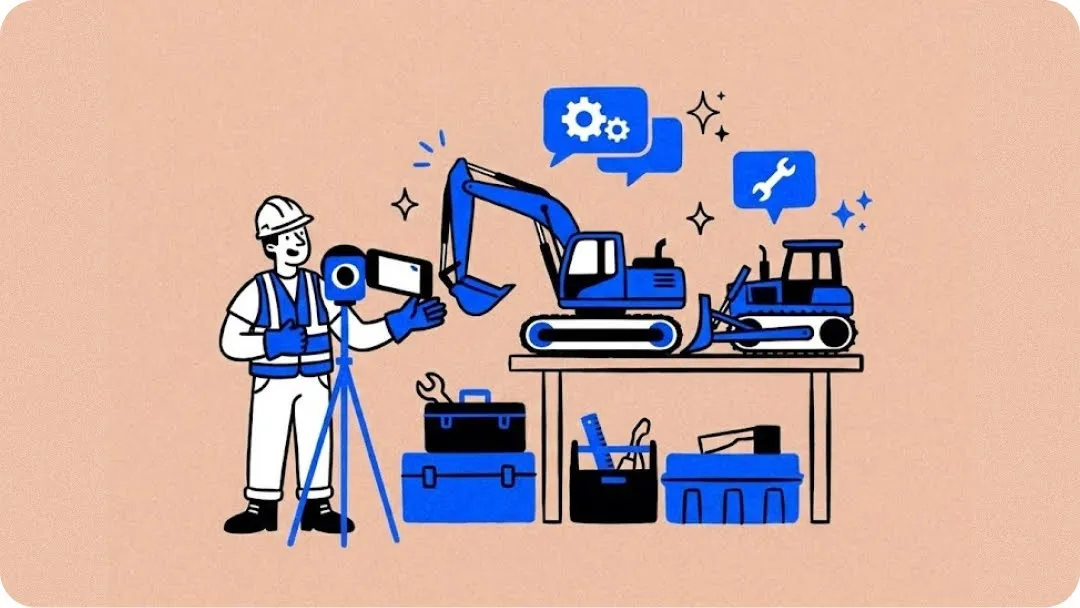







.webp)
.svg)


.svg)
.svg)
.svg)



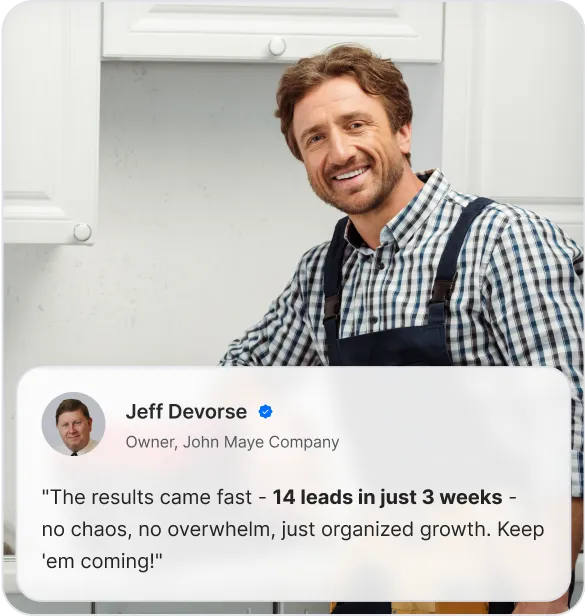
.svg)


